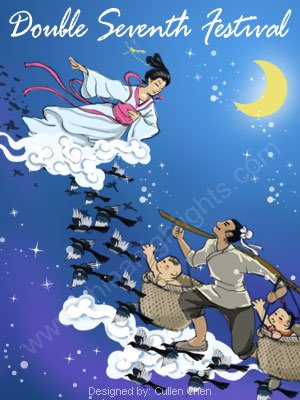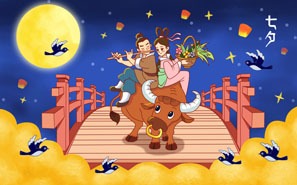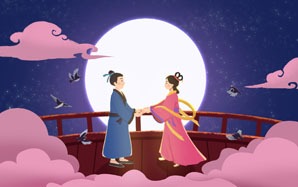- Joined
- Mar 31, 2020
- Messages
- 9,153
- Points
- 113
Double Seventh Festival - China's Valentine’s Day
www.chinahighlights.com
 A picture of the Double Seventh legend
A picture of the Double Seventh legend
The Double Seventh Festival (Qixi Festival) is one of Chinese traditional festivals, and also known as a Chinese Valentine's Day. It's based on a romantic legend about a weaver girl and an ox herd.
It falls on the 7th day of the 7th Chinese lunar month. In 2020 that's August 25 (Tuesday). There is no public holiday.
Double Seventh Festival Facts
Double Seventh Festival Dates (2020–2022)
The date is based on the Chinese lunar calendar, so it's about 21 to 51 days after the Gregorian date , i.e. in the period July 28 to August 28.
The History and Traditions of Double Seventh Day
 The festival has been celebrated since the Han Dynasty (206 BC – 220 AD). On May 20, 2015, the Double Seventh Festival was added to the National Intangible Cultural Heritage list by the State Council of China. Many of the traditional customs are disappearing, or no longer observed. You are more likely to find these practiced in rural areas:
The festival has been celebrated since the Han Dynasty (206 BC – 220 AD). On May 20, 2015, the Double Seventh Festival was added to the National Intangible Cultural Heritage list by the State Council of China. Many of the traditional customs are disappearing, or no longer observed. You are more likely to find these practiced in rural areas:
How China's Valentine's Day Is Celebrated Now
 Double Seven Festival is the most romantic of traditional Chinese festivals, and since China's globalization it's become known as "Chinese Valentine's Day".
Double Seven Festival is the most romantic of traditional Chinese festivals, and since China's globalization it's become known as "Chinese Valentine's Day".
Now people usually celebrate Chinese Valentine's Day by giving flowers, chocolates, and other presents to their sweethearts, instead of doing the traditional customs.
Though in Chinese cities, Western Valentine's Day is now more popular than Qixi with young people, the romantic legend of Niulang and Zhinü has taken deep root in the hearts of Chinese people. It probably always will be told from one generation to the next...
The Legend of Double Seventh Festival
 Qixi Festival originated from the legend of the cowherd and the weaver girl (Niulang and Zhinü).
Qixi Festival originated from the legend of the cowherd and the weaver girl (Niulang and Zhinü).
An oxherd Niulang with the help of his ox (the demoted cattle god) married a fairy, Zhinü, who became a weaver girl. Zhinü's mother, a goddess, returned Zhinü to heaven. Niulang pursued using the ox's hide. The goddess separated them by a river of stars (the Milky Way), but magpies were allowed to form a bridge for them to meet once a year (Qixi).
www.chinahighlights.com

The Double Seventh Festival (Qixi Festival) is one of Chinese traditional festivals, and also known as a Chinese Valentine's Day. It's based on a romantic legend about a weaver girl and an ox herd.
It falls on the 7th day of the 7th Chinese lunar month. In 2020 that's August 25 (Tuesday). There is no public holiday.
Double Seventh Festival Facts
- Chinese Name: 七夕节 Qīxījié /chee-sshee-jyeah/ 'Seventh Evening Festival'
- Date: August 25, 2020 (month 7 day 7 of the Chinese lunar calendar)
- History: over 2,000 years
- Celebrations: giving gifts (flowers, chocolates, ties...) to romantic partners, romantic dates - dinners, movies, etc.
Double Seventh Festival Dates (2020–2022)
The date is based on the Chinese lunar calendar, so it's about 21 to 51 days after the Gregorian date , i.e. in the period July 28 to August 28.
The History and Traditions of Double Seventh Day

- 1. Showing skills (demonstrating dexterity) was the most popular custom for women in the evening of Qixi. The longest standing way to "plead skills" was to speedily thread a needle under moonlight. Young women also carved exotic flowers, animals, and unusual birds, usually on a melon skin.
- 2. Worshiping the weaver fairy (the star Vega), Zhinü (/jrr-nyoo/) involved a table of offerings: tea, wine, fruits, longans, red dates, hazelnuts, peanuts, and melon seeds. In the evening young women sat around the table, displaying their needlework, gazing at Vega, and praying for a good husband and a happy life. Then they'd play games or read poems until midnight.
- 3. Honoring oxen: Children picked bunches of wild flowers and hung them on the horns of oxen in honor of the legendary ox. See below.
- 4. People made and ate 'Skill Fruit' (巧果 qiǎo guǒ /chyaoww-gwor/ 'skill fruit'): fried, thin pastries of different shapes.
How China's Valentine's Day Is Celebrated Now

Now people usually celebrate Chinese Valentine's Day by giving flowers, chocolates, and other presents to their sweethearts, instead of doing the traditional customs.
Though in Chinese cities, Western Valentine's Day is now more popular than Qixi with young people, the romantic legend of Niulang and Zhinü has taken deep root in the hearts of Chinese people. It probably always will be told from one generation to the next...
The Legend of Double Seventh Festival

- 牛郎 Niúláng /nyoh-lung/ 'ox youth'
- 织女 Zhínǚ /jrr-nyoo/ 'weaving girl' or 'Vega'
An oxherd Niulang with the help of his ox (the demoted cattle god) married a fairy, Zhinü, who became a weaver girl. Zhinü's mother, a goddess, returned Zhinü to heaven. Niulang pursued using the ox's hide. The goddess separated them by a river of stars (the Milky Way), but magpies were allowed to form a bridge for them to meet once a year (Qixi).
